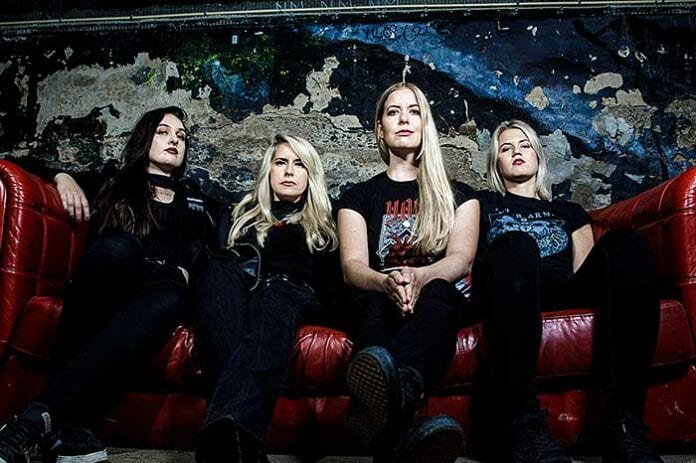
INTERVIEW WITH HEIDI WITHINGTON BRINK, SARA HELENA NØRREGAARD, RIKKE EMILIE LIST, AND JULIE SIMONSEN
BY KEVIN STEWART-PANKO
The rise of Copenhagen quartet Konvent has been astronomical. When bassist Heidi Withington Brink got the idea to direct her lifelong love of music towards actually creating and playing it, she didn’t let her inexperience get in the way. Teaming up with a collection of fellow exuberant amateurs from the local scene, Konvent was born, and in four short years, the doom/death quartet—Heidi, guitarist Sara Helena Nørregaard, vocalist Rikke Emilie List, and drummer Julie Simonsen—has gone from nervous newcomers to Danish festival regulars, a band with European tours under its belt, and a deal with Napalm Records, who are issuing the band’s debut, Puritan Masochism.
Konvent’s rise can be traced to a combination of wildfire word of mouth, not shying away from hard work, paying attention to detail, pouncing on available opportunity, some dumb luck, and, of course, some pretty solid death braised doom metal that’ll make listeners feel sunny elation as they slit their wrists in sludgy anguish. We sat down with the entire band via Skype after an evening rehearsal to discuss being the new kids on the block, the benefit of keeping an open mind, and why no one in Copenhagen screams, “Hey Lars,” when Mr. Ulrich is in town.
Being a fairly young band, it’s the question everyone is going to ask you and the question you’re going to come to hate, but it has to be asked. What can you tell us about the band’s history?
Heidi: It actually happened very coincidentally. I wanted to start a band back in 2015, and my roommate at the time was teaching our former drummer [Mette Marie List] how to play drums. So, her and I got together because we were basically on the same level. Rikke is Mette’s sister and had been taking extreme vocal lessons for some time before, so she was ready to get on board, too. We both knew Sara just from the metal scene in Copenhagen, and she had played guitar in another band when she was younger, but it had been some time. So, we were just starting out, kind of from scratch, but it was nice to be on the same level. It was also a coincidence that we’re all girls because there were no guys at the time who wanted to start a band with me. It just happened that it was the girls who wanted to.
Konvent wasn’t designed to be an all-female band from the start?
Heidi: Exactly.
Rikke: We were the losers who were left (laughs).
“WE NEVER SAT DOWN AND DECIDED THAT WE WANTED TO DO A DOOM METAL BAND. IT JUST CAME NATURALLY”
Was the doom/death genre you’re playing decided beforehand, or is that what came out when you started writing?
Rikke: Sara and Heidi brought some riffs to the table when we were first starting out, and our former drummer would come up with some drums to that. And it just developed into the kind of music that we play now.
Sara: We never sat down and decided that we wanted to do a doom metal band. It just came naturally with the riffs that came along, but we all decided we wanted to do something that was heavy and simple.
Heidi: And we knew we didn’t want clean vocals. We wanted growling vocals.
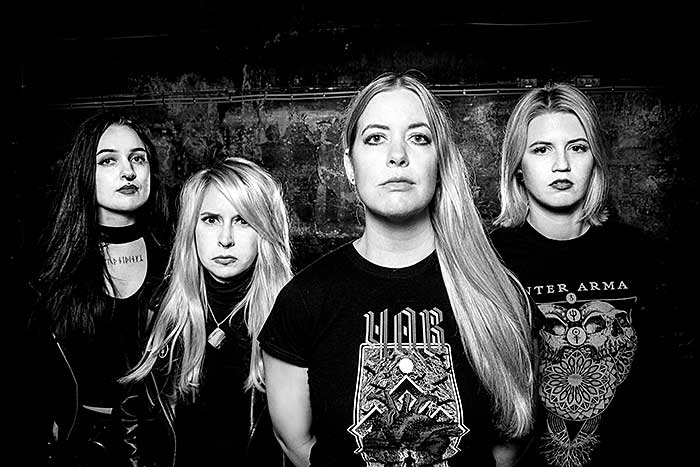
If there wasn’t a plan, were you surprised at what you were creating?
Heidi: Because I had just started playing on my instrument, I didn’t know any songs. I only knew the stuff I was trying to do for the band. I think there was some doubt about the first songs like, “Is this even a song?” When we made the first demo it was like, “Is this really a demo? Could you really put these sounds together and people will think of these as songs?” It might sound weird, but that’s really what we were thinking. We didn’t know if this was good enough.
Did you go back and discover the doom/death bands that would be considered main influences or gateway bands? Or did you already know those bands existed and just started listening to them more now that you were playing the style?
Sara: I think it was a combination. Of course, you get inspired by other bands that you like, but it was mostly the critics who would say we sound like this band and that band. But, we actually didn’t know those bands at the time, so we’d be like, “Do we?” So, we’d listen to them and it’d be like, “Ah, yes. Oh, they’re quite good.” (laughs)
Heidi: I don’t think any of us have listened to a lot of doom before, so it wasn’t really in the cards that this was going to be the music we played.
Rikke: But you were a big fan of Candlemass and Paradise Lost. When we started off I didn’t listen to doom metal at all. I was only listening to death metal or thrash. So, I was actually quite surprised that we ended up doing this, but now I listen to a lot of doom.
Heidi: But, of course, you’re always influenced by bands you know you’re influenced by and by bands that you’re indirectly influenced by without knowing that you are.
“PEOPLE ALWAYS DEMAND TO KNOW WHAT KIND OF GENRE YOU PLAY, BUT WE DON’T REALLY CARE. YOU CAN CALL IT WHATEVER YOU’D LIKE.”
Does that also mean there are there fewer limits on what you’re writing, especially as you come up with newer material?
Rikke: Absolutely. We don’t really care about genres and we only decided to call whatever we’re playing doom/death because people always demand to know what kind of genre you play, but we don’t really care. You can call it whatever you’d like. We don’t want to feel limited to a certain genre.
Sara: And I think it’s a good thing that we started from scratch, at the bottom. Heidi and our former drummer started playing their instruments in the band, so they haven’t played other songs and haven’t got this technical feeling when writing the riffs. It just seems natural to do whatever sounds good.
Heidi: I definitely think there’s a difference between the demo and now, and it’s very easy to hear on the album that it’s not one genre all the way through. You can hear different elements of different genres in different songs. Some songs are a little bit more blackened death and some are a bit more classic/old school doom, and I really like that, that it doesn’t have to be one thing.
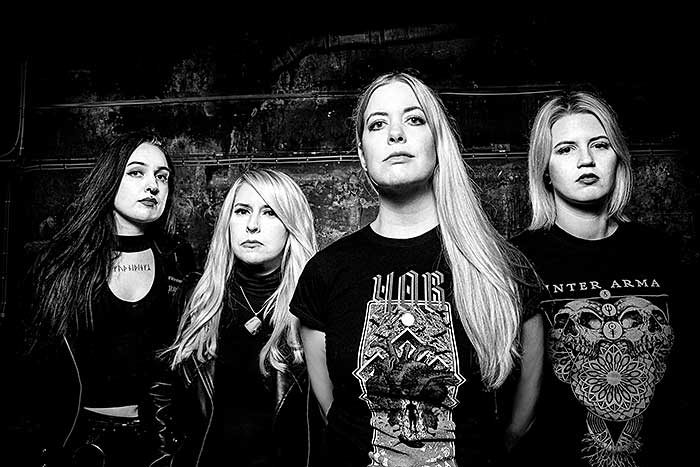
When you recorded your demo, it was the first time in the studio for all of you, correct? Now that you’ve recorded an album, what have you learned and what have been the biggest challenges?
Sara: I think we learned how important it is to define your own sound or at least thinking about and taking the time to create your own kind of sound. I think that we all learned how to sound nice together.
Heidi: And also how much you can explore your sound. How much you can do, how much extra stuff you can play with, and how creative you can be. We discovered that in the demo phase, but we also really discovered that when we did the debut album, which was with another producer in another studio. It’s a lot of fun to try and do a lot of weird, cool stuff in the studio.
Sara: Also, going in with an open mind. If you come into the studio with the thinking that the album is done before you record anything, I think you’ll have a bad time with the recording. It’s very important to be open minded and creative about what’s going to develop in the studio.
Julie: Our producer had a lot of great ideas that we hadn’t really thought of, and he extended them to us and they just worked. You have to be open minded about opinions and suggestions.
Sara: We recorded the album live, which meant we were playing the songs maybe a hundred times, but it wasn’t that bad. It was actually a good experience to do it that way, to get that live experience and get that live feeling, vibe, and energy.
“IT INSPIRES A LOT OF STORYTELLING BECAUSE IT’S SUCH A SECRET SOCIETY”
What’s the story or significance behind the band’s name?
Rikke: When we needed a name for the band, I think one of the first suggestions came from Heidi, who suggested the Danish word “kloster,” which means convent or monastery. But, of course, there was already a band with that name, so I suggested that we might translate it, call it Convent, but keep the “K” instead of the “C.” We thought about it while trying to find a name for something like three months after that. There were a lot of good suggestions, but all four of us, we couldn’t agree on anything. One day, I think it was Sara who had had enough and said, “What about Konvent, as you suggested?” And we all agreed that we all liked that name. The reason we liked the name was that we really liked the idea of a convent or a monastery. I feel like it inspires a lot of storytelling because it’s such a secret society of the nuns who live there, there’s a lot of ritual, there’s a very strict hierarchy, and it’s very closed to the public, so you can create a lot of stories in your head about what’s going on behind those big walls.
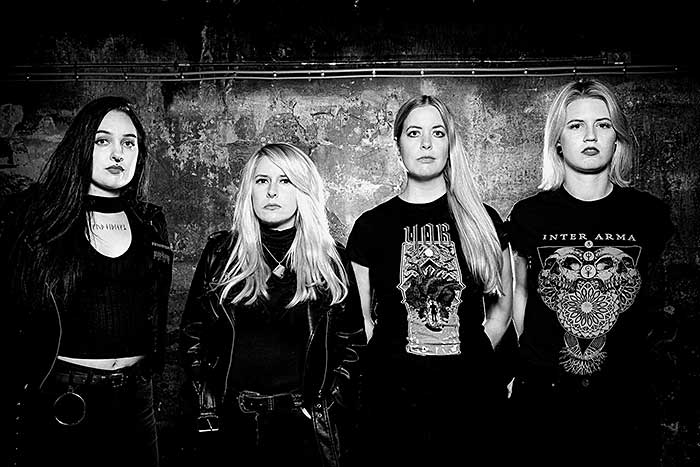
I actually live down the street from a convent and didn’t even know nunnery was a thing until I realized they’re in my neighborhood. Not just the old, hunchback penguin stereotype either, like young women choosing to be nuns. Is your selecting Konvent as the band name have anything to do with nunnery still being a common thing in Denmark?
Rikke: No. Occasionally, you’ll see a nun walking around, but it’s very rare.
Julie: And when you do, it’s always like, “Oh my god, there’s a nun!”
Rikke: “Take a photo!” (laughs)
Sara: But when you see them, it’s not like you’d think when you think of a true nun. They’re not dressed in the full black gown. They’re dressed in blue dresses.
Rikke: They’re very discreet. But in general, religion isn’t really a big thing here in Denmark. It’s bigger in the south of Europe, but in the north it’s not that big a thing. There’s not a lot of religious people in Denmark, I find.
Was there a plan when you released the demo, and were you surprised at how quickly things moved?
All: Yes!
Sara: It was also funny because we just called it Demo. Looking back at that, it was so stupid to just call the demo Demo (laughs), but what we felt at that time was that it was only a demo and we never felt that people from foreign countries would contact us and listen to it and ask us if we wanted to play and stuff like that. It never crossed our minds.
Rikke: It was very last minute where we thought, “Maybe we should have thought of a title?” We hadn’t thought about it at all, we’d been so busy with the recording. I think we may have thought about it for five minutes and we couldn’t come up with something.
Heidi: But I also think that’s what happens when you have all of us starting from scratch and having only one of us play in a band before. We didn’t really know what we were supposed to do. We were just focusing on the music and having fun with it, and then, when the demo came out, more and more stuff happened, and more and more attention came to it and people wanted to review it, but we hadn’t sent it to anyone at all because we didn’t know if it was good enough.
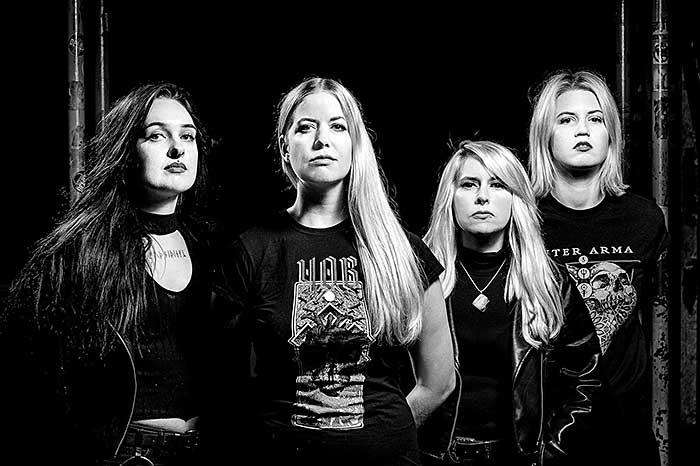
How did you end up getting it out there?
Heidi: We put it on Bandcamp. That was the only thing we did. We didn’t put it on Spotify because we didn’t know how to (laughs). We just started posting about it on our Facebook. We all know a lot of people in the metal community here in Denmark and that was a good start.
Rikke: Especially because Denmark is such a small country, and the metal scene is very tiny so there’s not a long way from us starting at the bottom to getting to radio hosts who have shows or the bigger metal bloggers or reviewers. So, maybe that was our luck, that the community is quite small and everybody talks to everybody and rumors travel fast.
“OF COURSE, BEING ALL GIRLS WHO ARE PLAYING METAL ATTRACTS ATTENTION. WE STAND OUT.”
What did the demo help you accomplish?
Sara: I think it was a combination of doing the demo and saying yes to a lot of gigs. We got a lot of offers based on the demo, and I don’t think that it’s very common that a band that has only done four songs gets offers to play the Roskilde Festival or Copenhell, but I think it was a combination that we were doing a lot of gigs and showing our faces.
Heidi: And also in January 2018, we played a networking/music business festival that showcases the new cool metal bands in Denmark for record labels, business people, and booking agencies from around Europe. It happened to be that there was a guy from Napalm Records there the night we played who saw us and offered us a worldwide deal, and that also gave us a lot of attention.
Sara: And, of course, being all girls who are playing metal attracts attention. We stand out.
What do you think you learned from playing live that you applied to the full-length?
Sara: I think we’re still on a big learning curve. We still learn a lot when we play live, but…that’s a tough question (laughs).
Rikke: I don’t think that during the writing process we think about the live performance of the song that we’re writing.
Even though you record live?
Julie: I think it’s more like when you get more and more comfortable with your instrument, you feel like you have more control and more creativity when you write stuff, then it becomes more fun and more relaxed and becomes more instinctual.
How would you compare the experience of recording Puritan Masochism versus the demo?
Heidi: I was more relaxed the second time in.
Sara: But still we have higher expectations, which we didn’t have in the beginning with the demo, where it was, “Cool, we have four songs. Let’s go into the studio and see what happens.” Now, with the album we know what sounds we like.
“HUMANS HAVE A TENDENCY TO DO STUFF THAT MAKES US FEEL BAD BECAUSE WE THINK THAT THAT’S THE WAY WE SHOULD LIVE”
What’s the story behind the album’s title?
Rikke: The title is also the title of our first single. We’d been thinking about a title for the album for so long and we couldn’t figure anything out. Then, Sara or Heidi suggested maybe calling the album Puritan Masochism, and we all liked it because it’s a cool title. We thought about calling the song something else, but we couldn’t figure anything out (laughs). I think that’s the oldest song on the record so it was very weird to think about calling it something else, so we ended up calling the album Puritan Masochism after the song. The title is a reference to the way us humans have a tendency to do stuff that makes us feel bad because we think that that’s the way we should live our lives or how we should act, and usually that’s without even realizing it. It could be anything.
Sara: It’s our way of saying, “You don’t have to live like this.”
Rikke: It’s like identifying if you’re doing these things and realizing that you don’t have to and that you can live your life someway else. But sometimes we don’t even realize it because we live on autopilot and get into our habits, think that’s the way life is, and don’t question. It’s our way of saying, “Wake up and kill your masters,” but don’t actually kill anyone. That’s a no-no (laughs).
Given your quick ascension from learning to play your instruments on the job, doing a demo, starting to play live, signing with a big label, and recording your debut record, what has been most surprising about what you’ve encountered in the music business?
Heidi: One thing that we all noticed, and it’s probably the same for every other band on the planet, is how much it’s not about the music, but everything else you’re doing. All the practical stuff—writing emails, being in contact with the record label and booking agent, doing merch designs, figuring out the economics, planning a tour…the list goes on and on. There’s so much that’s not about the music, and that really surprised me when I started playing in a band. For two years, I used to own a booking agency that booked shows and tours for metal bands, so I’d been around bands, but never in one and I always remember thinking about how difficult the bands were to work with, why are they not responding to emails in time, why is everything such a struggle? Now I know why.
Rikke: Being in a band is 80 percent admin.
Heidi: But I think it’s fun, too. It’s a part of it. It’s not to say it’s something negative, it’s just something that’s very surprising.
Rikke: But it’s still more fun to play the music (laughs).
Here are a couple of non-Konvent, Copenhagen related questions for you, just out of my own curiosity. First, does the Freetown Christiana squat section of the city still exist?
Heidi: Yes! Where we are now, we’re actually just next to it, almost.
Rikke: It’s always being shut down, but it never really gets shut down. It’s Pusher Street that gets shut down and the day after it pops up again.
Heidi: It’s never been the whole Freetown that gets shut down, never where people actually live, just the places where they sell weed. That’s because the residents of Christania got sick of it a few years back because there were too many hard drugs and gang related violence done by masked gangs, whereas in the past it was more like hippies selling weed. But it’s not that bad, I’m making it sound way worse than it is. We could all go there, it’s still safe.
Julie: It’s kind of creepy though. I wouldn’t walk around with my phone out.
I’ve never been there, only read about it. What’s there? Is it a bunch of residences, shops, clubs?
Heidi: It used to be an old military base, and because of the bad housing situation back in the 60s, a bunch of hippies decided to take over this area and start building their own houses. So, they got this deal of being a Freetown where they don’t pay any rent and they just built these houses out of sustainable material. You’ll see houses looking like spaces ships, houses made only out of glass. It’s so cool and creative and it’s such a nice place. They have their own kindergarten, their own school, their own kind of environment, their own laws as well. They have venues and restaurants and cafes. It’s so nice in the summer because it’s like a small nature preserve in the middle of the city and it’s right next to the canal and the water. It’s very beautiful.
Copenhagen question number two. Do you still feel the influence of Torben and Lars Ulrich around town?
All: (laughter)
Julie: I think as a drummer from Denmark, there’s always going to be a Lars comparison, which I really don’t know if that’s a compliment, but it’s easy. With Lars, it’s a love-hate relationship because he’s so arrogant, but still kind of cute and small and kind of dumb, but in a cute way. I don’t know, he’s like the goofy uncle.
Heidi: But I don’t think he’s very Danish in his way of behaving. He’s way more American.
Rikke: I think Lars pops up in conversations quite a bit. He’s always in the back of everybody’s minds all the time.
Is he still a local celebrity when he comes to town?
Rikke: Yeah, yeah. Absolutely.
Heidi: I’ve never seen him in real life. I’ve only ever seen the guys from Volbeat in real life here and at shows.
Julie: I think I saw him one time here on the street with his model girlfriend and they walked by. It wasn’t like I was like, “Hey, Lars!” and we were hanging out.
Heidi: It’s not a big thing for Danish people, when we see a celebrity, to go crazy as Americans would do. We don’t want to disturb them.
So, if you saw King Diamond walking down the street, you’d all leave him alone?
Heidi: I’ve seen King Diamond here before, and I’ve seen Michael Denner, Mercyful Fate’s guitarist. I used to do a record fair and he was selling records and everyone was just relaxed around him.
What does Konvent have planned for the future?
All: We want to play 70000Tons of Metal!
Heidi: We want to do stuff with this album. We just want to go out and play as much as we can and explore new territories. We’ve played cities in Denmark and a couple awesome cities in Germany, but we’re really excited about going on our release tour through Denmark, Sweden, Norway, and Germany. We’re playing some cool festivals in the summer and a Viking festival in the UK in November (laughs). Whenever we get to a new city that’s awesome and exciting for us, there’s so much potential in going out to new places that might not make a lot of sense, but it could make for a really great experience.




















